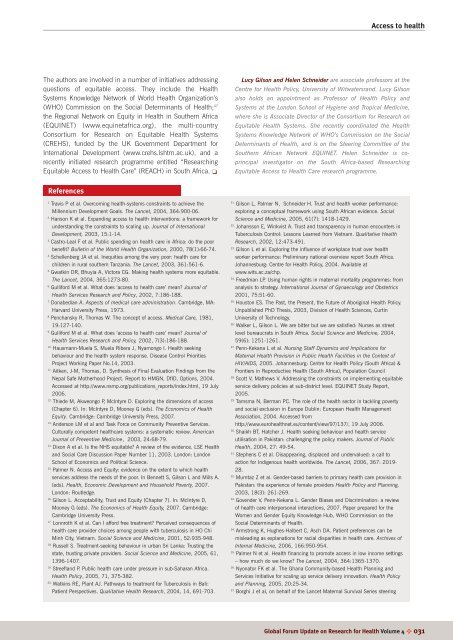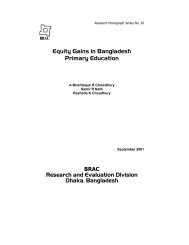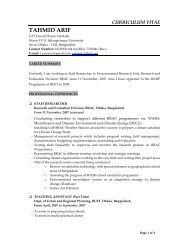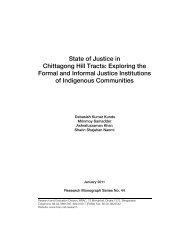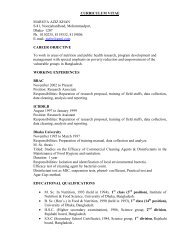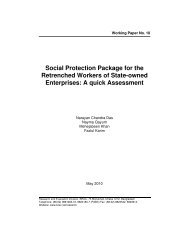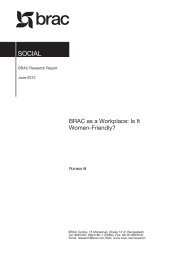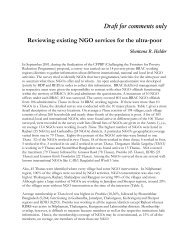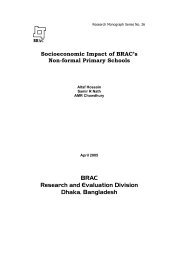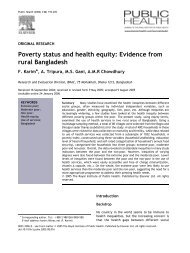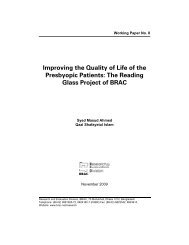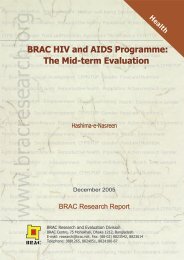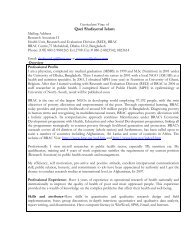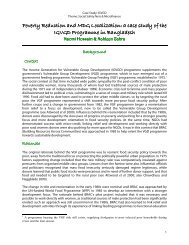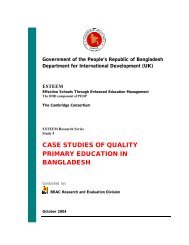Combining health and social protection measures to reach the ultra ...
Combining health and social protection measures to reach the ultra ...
Combining health and social protection measures to reach the ultra ...
Create successful ePaper yourself
Turn your PDF publications into a flip-book with our unique Google optimized e-Paper software.
Access <strong>to</strong> <strong>health</strong><br />
The authors are involved in a number of initiatives addressing<br />
questions of equitable access. They include <strong>the</strong> Health<br />
Systems Knowledge Network of World Health Organization’s<br />
(WHO) Commission on <strong>the</strong> Social Determinants of Health; 47<br />
<strong>the</strong> Regional Network on Equity in Health in Sou<strong>the</strong>rn Africa<br />
(EQUINET) (www.equinetafrica.org), <strong>the</strong> multi-country<br />
Consortium for Research on Equitable Health Systems<br />
(CREHS), funded by <strong>the</strong> UK Government Department for<br />
International Development (www.crehs.lshtm.ac.uk), <strong>and</strong> a<br />
recently initiated research programme entitled “Researching<br />
Equitable Access <strong>to</strong> Health Care” (REACH) in South Africa. ❏<br />
Lucy Gilson <strong>and</strong> Helen Schneider are associate professors at <strong>the</strong><br />
Centre for Health Policy, University of Witwatersr<strong>and</strong>. Lucy Gilson<br />
also holds an appointment as Professor of Health Policy <strong>and</strong><br />
Systems at <strong>the</strong> London School of Hygiene <strong>and</strong> Tropical Medicine,<br />
where she is Associate Direc<strong>to</strong>r of <strong>the</strong> Consortium for Research on<br />
Equitable Health Systems. She recently coordinated <strong>the</strong> Health<br />
Systems Knowledge Network of WHO’s Commission on <strong>the</strong> Social<br />
Determinants of Health, <strong>and</strong> is on <strong>the</strong> Steering Committee of <strong>the</strong><br />
Sou<strong>the</strong>rn African Network EQUINET. Helen Schneider is coprincipal<br />
investiga<strong>to</strong>r on <strong>the</strong> South Africa-based Researching<br />
Equitable Access <strong>to</strong> Health Care research programme.<br />
References<br />
1.<br />
Travis P et al. Overcoming <strong>health</strong>-systems constraints <strong>to</strong> achieve <strong>the</strong><br />
Millennium Development Goals. The Lancet, 2004, 364:900-06.<br />
2.<br />
Hanson K et al. Exp<strong>and</strong>ing access <strong>to</strong> <strong>health</strong> interventions: a framework for<br />
underst<strong>and</strong>ing <strong>the</strong> constraints <strong>to</strong> scaling up. Journal of International<br />
Development, 2003, 15:1-14.<br />
3.<br />
Castro-Leal F et al. Public spending on <strong>health</strong> care in Africa: do <strong>the</strong> poor<br />
benefit? Bulletin of <strong>the</strong> World Health Organization, 2000, 78(1):66-74.<br />
4.<br />
Schellenberg JA et al. Inequities among <strong>the</strong> very poor: <strong>health</strong> care for<br />
children in rural sou<strong>the</strong>rn Tanzania. The Lancet, 2003, 361:561-6.<br />
5.<br />
Gwatkin DR, Bhuyia A, Vic<strong>to</strong>ra CG. Making <strong>health</strong> systems more equitable.<br />
The Lancet, 2004, 365:1273-80.<br />
6.<br />
Gulliford M et al. What does ‘access <strong>to</strong> <strong>health</strong> care’ mean? Journal of<br />
Health Services Research <strong>and</strong> Policy, 2002, 7:186-188.<br />
7.<br />
Donabedian A. Aspects of medical care administration. Cambridge, MA:<br />
Harvard University Press, 1973.<br />
8.<br />
Penchansky R, Thomas W. The concept of access. Medical Care, 1981,<br />
19:127-140.<br />
9.<br />
Gulliford M et al. What does ‘access <strong>to</strong> <strong>health</strong> care’ mean? Journal of<br />
Health Services Research <strong>and</strong> Policy, 2002, 7(3):186-188.<br />
10.<br />
Hausmann-Muela S, Muela Ribera J, Nyamongo I. Health seeking<br />
behaviour <strong>and</strong> <strong>the</strong> <strong>health</strong> system response. Disease Control Priorities<br />
Project Working Paper No.14, 2003.<br />
11.<br />
Aitken, J-M, Thomas, D. Syn<strong>the</strong>sis of Final Evaluation Findings from <strong>the</strong><br />
Nepal Safe Mo<strong>the</strong>rhood Project. Report <strong>to</strong> HMGN, DfID, Options, 2004.<br />
Accessed at http://www.nsmp.org/publications_reports/index.html, 19 July<br />
2006.<br />
12.<br />
Thiede M, Akweongo P, McIntyre D. Exploring <strong>the</strong> dimensions of access<br />
(Chapter 6). In: McIntyre D, Mooney G (eds). The Economics of Health<br />
Equity. Cambridge: Cambridge University Press, 2007.<br />
13.<br />
Anderson LM et al <strong>and</strong> Task Force on Community Preventive Services.<br />
Culturally competent <strong>health</strong>care systems: a systematic review. American<br />
Journal of Preventive Medicine, 2003, 24:68-79.<br />
14.<br />
Dixon A et al. Is <strong>the</strong> NHS equitable? A review of <strong>the</strong> evidence. LSE Health<br />
<strong>and</strong> Social Care Discussion Paper Number 11, 2003. London: London<br />
School of Economics <strong>and</strong> Political Science.<br />
15.<br />
Palmer N. Access <strong>and</strong> Equity: evidence on <strong>the</strong> extent <strong>to</strong> which <strong>health</strong><br />
services address <strong>the</strong> needs of <strong>the</strong> poor. In Bennett S, Gilson L <strong>and</strong> Mills A.<br />
(eds). Health, Economic Development <strong>and</strong> Household Poverty, 2007.<br />
London: Routledge.<br />
16.<br />
Gilson L. Acceptability, Trust <strong>and</strong> Equity (Chapter 7). In: McIntyre D,<br />
Mooney G (eds). The Economics of Health Equity, 2007. Cambridge:<br />
Cambridge University Press.<br />
17.<br />
Lonnroth K et al. Can I afford free treatment? Perceived consequences of<br />
<strong>health</strong> care provider choices among people with tuberculosis in HO Chi<br />
Minh City, Vietnam. Social Science <strong>and</strong> Medicine, 2001, 52:935-948.<br />
18.<br />
Russell S. Treatment-seeking behaviour in urban Sri Lanka: Trusting <strong>the</strong><br />
state, trusting private providers. Social Science <strong>and</strong> Medicine, 2005, 61,<br />
1396-1407.<br />
19.<br />
Streefl<strong>and</strong> P. Public <strong>health</strong> care under pressure in sub-Saharan Africa.<br />
Health Policy, 2005, 71, 375-382.<br />
20.<br />
Watkins RE, Plant AJ. Pathways <strong>to</strong> treatment for Tuberculosis in Bali:<br />
Patient Perspectives. Qualitative Health Research, 2004, 14, 691-703.<br />
21.<br />
Gilson L, Palmer N, Schneider H. Trust <strong>and</strong> <strong>health</strong> worker performance:<br />
exploring a conceptual framework using South African evidence. Social<br />
Science <strong>and</strong> Medicine, 2005, 61(7): 1418-1429.<br />
22.<br />
Johansson E, Winkvist A. Trust <strong>and</strong> transparency in human encounters in<br />
Tuberculosis Control: Lessons Learned from Vietnam. Qualitative Health<br />
Research, 2002, 12:473-491.<br />
23.<br />
Gilson L et al. Exploring <strong>the</strong> influence of workplace trust over <strong>health</strong><br />
worker performance: Preliminary national overview report South Africa.<br />
Johannesburg: Centre for Health Policy, 2004. Available at<br />
www.wits.ac.za/chp.<br />
24.<br />
Freedman LP. Using human rights in maternal mortality programmes: from<br />
analysis <strong>to</strong> strategy. International Journal of Gynaecology <strong>and</strong> Obstetrics<br />
2001, 75:51-60.<br />
25.<br />
Hous<strong>to</strong>n ES. The Past, <strong>the</strong> Present, <strong>the</strong> Future of Aboriginal Health Policy.<br />
Unpublished PhD Thesis, 2003, Division of Health Sciences, Curtin<br />
University of Technology.<br />
26.<br />
Walker L, Gilson L. We are bitter but we are satisfied: Nurses as street<br />
level bureaucrats in South Africa. Social Science <strong>and</strong> Medicine, 2004,<br />
59(6): 1251-1261.<br />
27.<br />
Penn-Kekana L et al. Nursing Staff Dynamics <strong>and</strong> Implications for<br />
Maternal Health Provision in Public Health Facilities in <strong>the</strong> Context of<br />
HIV/AIDS, 2005. Johannesburg: Centre for Health Policy (South Africa) &<br />
Frontiers in Reproductive Health (South Africa), Population Council<br />
28.<br />
Scott V, Ma<strong>the</strong>ws V. Addressing <strong>the</strong> constraints on implementing equitable<br />
service delivery policies at sub-district level. EQUINET Study Report,<br />
2005.<br />
29.<br />
Tamsma N, Berman PC. The role of <strong>the</strong> <strong>health</strong> sec<strong>to</strong>r in tackling poverty<br />
<strong>and</strong> <strong>social</strong> exclusion in Europe Dublin: European Health Management<br />
Association, 2004. Accessed from<br />
http://www.euro<strong>health</strong>net.eu/content/view/97/137/, 19 July 2006.<br />
30.<br />
Shaikh BT, Hatcher J. Health seeking behaviour <strong>and</strong> <strong>health</strong> service<br />
utilisation in Pakistan: challenging <strong>the</strong> policy makers. Journal of Public<br />
Health, 2004, 27: 49-54.<br />
31.<br />
Stephens C et al. Disappearing, displaced <strong>and</strong> undervalued: a call <strong>to</strong><br />
action for Indigenous <strong>health</strong> worldwide. The Lancet, 2006, 367: 2019-<br />
28.<br />
32.<br />
Mumtaz Z et al. Gender-based barriers <strong>to</strong> primary <strong>health</strong> care provision in<br />
Pakistan: <strong>the</strong> experience of female providers Health Policy <strong>and</strong> Planning,<br />
2003, 18(3): 261-269.<br />
33.<br />
Govender V, Penn-Kekana L. Gender Biases <strong>and</strong> Discrimination: a review<br />
of <strong>health</strong> care interpersonal interactions, 2007. Paper prepared for <strong>the</strong><br />
Women <strong>and</strong> Gender Equity Knowledge Hub, WHO Commission on <strong>the</strong><br />
Social Determinants of Health.<br />
34.<br />
Armstrong K, Hughes-Halbert C, Asch DA. Patient preferences can be<br />
misleading as explanations for racial disparities in <strong>health</strong> care. Archives of<br />
Internal Medicine, 2006, 166:950-954.<br />
35.<br />
Palmer N et al. Health financing <strong>to</strong> promote access in low income settings<br />
– how much do we know? The Lancet, 2004, 364:1365-1370.<br />
36.<br />
Nyona<strong>to</strong>r FK et al. The Ghana Community-based Health Planning <strong>and</strong><br />
Services Initiative for scaling up service delivery innovation. Health Policy<br />
<strong>and</strong> Planning, 2005, 20:25-34.<br />
37.<br />
Borghi J et al, on behalf of <strong>the</strong> Lancet Maternal Survival Series steering<br />
Global Forum Update on Research for Health Volume 4 ✜ 031


